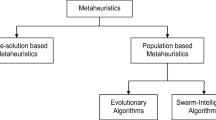Abstract
Hybrid genetic algorithms (HGAs) have recognized significant attention in recent years and being progressively more used to solve real-world problems. HGA is the forms of assimilation between genetic algorithm and other search optimization techniques to improve the overall performance of the genetic algorithm (GA). GA can be hybridized with many other bio-inspired heuristic algorithms such as particle swarm optimization, cuckoo search genetic algorithm, firefly algorithm-genetic algorithm, real coded genetic algorithm-artificial fish swarm algorithm, etc., multi-agent system (MAS) is a new paradigm for conceptualizing, designing and optimizing the solution models. Multi-agent learning concept improves the outcome of the MAS and the type of learning process involved in it plays a vital role. Incremental model is a well-known software development process in which the system yields better effect at the end of every cycle. In this paper, software engineering inspired incremental model based multi-agent learning model for permutation coded genetic algorithms has been proposed. One of the famous combinatorial hard problems of traveling salesman problem (TSP) is being chosen as the test bed and the experiments are performed on large sized benchmark TSP instances obtained from standard TSPLIB. The experimental results support that the proposed model perform better than existing best working initialization methods in terms of convergence rate, error rate and computation time.













Similar content being viewed by others
References
Kanagaraj, G., Ponnambalam, S.G., Jawahar, N.: A hybrid cuckoo search and genetic algorithm for reliability–redundancy allocation problems. Comput. Ind. Eng. 66, 1115–1124 (2013)
Fang, N., Zhou, J., Zhang, R., Liu, Y., Zhang, Y.: A hybrid of real coded genetic algorithm and artificial fish swarm algorithm for short-term optimal hydrothermal scheduling. Electr. Power Energy Syst. 62, 617–629 (2014)
Victer Paul, P., Moganarangan, N., Sampath Kumar, S., Raju, R., Vengattaraman, T., Dhavachelvan, P.: Performance analyses over population seeding techniques of the permutation-coded genetic algorithm: an empirical study based on traveling salesman problems. Appl. Soft Comput. 32, 383–402 (2015)
Garai, G., Chaudhurii, B.B.: A novel hybrid genetic algorithm with Tabu search for optimizing multi-dimensional functions and point pattern recognition. Inf. Sci. 221, 28–48 (2013)
Kuo, R.J., Zulvia, F.E., Suryadi, K.: Hybrid particle swarm optimization with genetic algorithm for solving capacitated vehicle routing problem with fuzzy demand—a case study on garbage collection system. Appl. Math. Comput. 219, 2574–2588 (2012)
Victer Paul, P., Ramalingam, A., Baskaran, R., Dhavachelvan, P., Vivekanandan, K., Subramanian, R.: A new population seeding technique for permutation-coded genetic algorithm: service transfer approach. J. Comput. Sci. 5, 277–297 (2014). ISSN: 1877-7503
Momeni, E., Nazir, R., Jahed Armaghani, D., Maizir, H.: Prediction of pile bearing capacity using a hybrid genetic algorithm-based ANN. Measurement 57, 122–131 (2014)
Wong, T.C., Ngan, S.C.: A comparison of hybrid genetic algorithm and hybrid particle swarm optimization to minimize makespan for assembly job shop T.C. Appl. Soft Comput. 13, 1391–1399 (2013)
Tao, D., Tang, S., Liu, L.: Constrained artificial fish-swarm based area coverage optimization algorithm for directional sensor networks. In: 2013 IEEE 10th International Conference on Mobile Ad-Hoc and Sensor Systems, pp. 304–309 (2013)
Denton, J.A., Beveridge, J.R.: An algorithm for projective point matching in the presence of spurious points. Pattern Recogn. 40, 586–595 (2007)
Garai, G., Chaudhuri, B.B.: A cascaded genetic algorithm for efficient optimization and pattern matching. Image Vis. Comput. 20, 265–277 (2002)
Chai-ead, N., Aungkulanon, P., Luangpaiboon, P.: Bees and firefly algorithms for noisy non-linear optimisation problems. In: Proceedings of the International MultiConference of Engineers and Computer Scientists, Hong Kong, vol. 2, pp. 1449–1454 (2011)
Hoseini, P., Shayesteh, M.G.: Efficient contrast enhancement of images using hybrid ant colony optimisation, genetic algorithm, and simulated annealing. Digit. Signal Process. 23(2013), 879–893 (2012)
Rahmani, A., MirHassani, S.A.: A hybrid firefly-genetic algorithm for the capacitated facility location problem. Inf. Sci. 283, 70–78 (2014)
Victer Paul, P., Saravanan, N., Jayakumar, S.K.V., Dhavachelvan, P., Baskaran, R.: QoS enhancements for global replication management in peer to peer networks. Fut. Gener. Comput. Syst. 28(3), 573–582 (2012). ISSN: 0167-739X
Manogaran, G., et al.: A new architecture of Internet of Things and big data ecosystem for secured smart healthcare monitoring and alerting system. Fut. Gener. Comput. Syst. (2017). https://doi.org/10.1016/j.future.2017.10.045
Varatharajan, R., Manogaran, G., Priyan, M.K.: A big data classification approach using LDA with an enhanced SVM method for ECG signals in cloud computing. Multimed. Tools Appl. (2017). https://doi.org/10.1007/s11042-017-5318-1
Goldberg, D.E.: Genetic Algorithms in Search, Optimization, and Machine Learning. Addison-Wesley, Boston (1989)
Kumar, P.M., Gandhi, U., Varatharajan, R., et al.: Intelligent face recognition and navigation system using neural learning for smart security in Internet of Things. Clust. Comput. (2017). https://doi.org/10.1007/s10586-017-1323-4
Victer Paul, P., Rajaguru, D., Saravanan, N., Baskaran, R., Dhavachelvan, P.: Efficient service cache management in mobile P2P networks. Fut. Gener. Comput. Syst. 29(6), 1505–1521 (2013). ISSN: 0167-739X
Manogaran, G., Priyan, M.K., Varatharajan, R.: Hybrid recommendation system for heart disease diagnosis based on multiple kernel learning with adaptive neuro-fuzzy inference system. Multimed. Tools Appl. (2017). https://doi.org/10.1007/s11042-017-5515-y
Saravanan, N., Baskaran, R., Shanmugam, M., Saleem Basha, M.S., Victer Paul, P.: An effective model for QoS assessment in data caching in MANET environments. Int. J. Wirel. Mob. Comput. 6(5), 515–527 (2013). ISSN: 1741-1092
Herwan Sulaiman, M., Daniyal, H., Wazir Mustafa, M.: Modified firefly algorithm in solving economic dispatch problems with practical constraints. In: IEEE International Conference on Power and Energy (PECon), Kota Kinabalu Sabah, Malaysia, pp. 143–147 (2012)
Botee, H.M., Bonabeau, E.: Evolving ant colony optimization. Adv. Complex Syst. 1, 149–159 (1998)
Author information
Authors and Affiliations
Corresponding author
Rights and permissions
About this article
Cite this article
Ayshwarya Lakshmi, S., Sahaaya Arul Mary, S.A. Multi-agent learning technique inspired from software engineering model for permutation coded GA. Cluster Comput 22 (Suppl 6), 13653–13667 (2019). https://doi.org/10.1007/s10586-018-2055-9
Received:
Revised:
Accepted:
Published:
Issue Date:
DOI: https://doi.org/10.1007/s10586-018-2055-9




